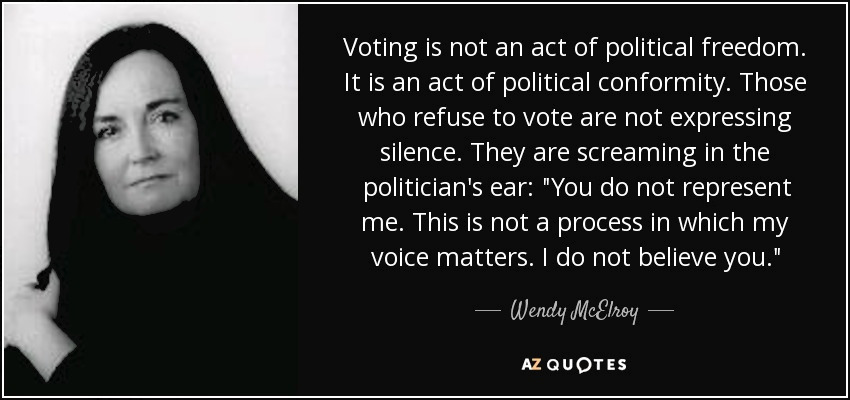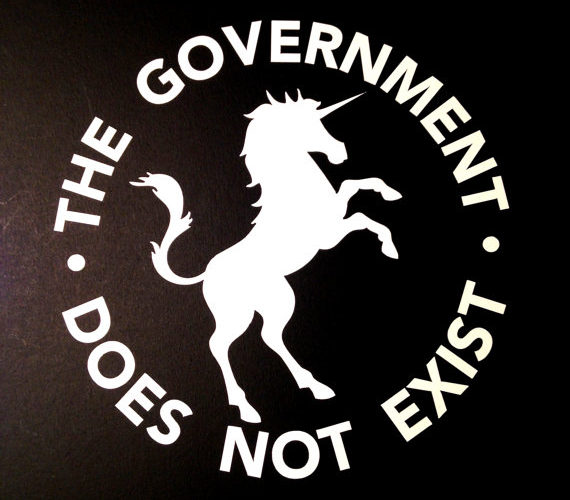Wendy McElroy is a Canadian individualist anarchist and individualist feminist. She was a co-founder along with Carl Watner and George H. Smith of The Voluntaryist magazine in 1982.
Act Responsibly: Don’t Vote! That’s not a bumper sticker you’re likely to see in coming weeks. Instead the ballot will be revered like a religious object and voting will be declared a duty. But what if the ballot is just one more government form to fill out? What if the most politically powerful act is to say “no” by tearing the form in half?
This November, most people won’t “do it” in the voting booth despite attempts to shame them. They will spend the time on activities that enrich their lives: buying groceries, playing with children, catching up on work. Even the recent primary, which was supposed to reflect a galvanized and outraged Democratic Party, drew only about 11.4 percent of those eligible to vote. The Republican primary fared worse with a record low turnout of about 6.6 percent.
If war itself can’t motivate people to put a checkmark in a box, it is time to consider non-voting from a radically different perspective. Maybe non-voters are right. After all, if most people refuse to buy a product with which they’re acquainted, do you blame them or the product? Politicians have only themselves to blame if people are not buying what they sell.
The knee-jerk response is to accuse non-buyers of apathy. In many cases, this may be true but it isn’t the non-voter’s fault if he thinks a ballot is irrelevant to his life. Gerrymandered voting districts that almost ensure results, preppy and prepped candidates, a two-party system that restricts access to alternate voices, candidates in debt to corporate sponsors and lobbyists, campaign promises that dissolve, corrupt procedures which make many believe Al Gore is the rightfully-elected President. The notoriously corrupt New York politician Boss Tweed once said, “You may elect whatever candidates you please to office, if you will allow me to select the candidates.” In short, by the time names are on the ballot, the fix is in. And apathy becomes a reasonable response.
Non-voting is a gauge of how deeply alienated the average person is from the political establishment. Sometimes political disgust converts non-voting from an act of indifference to one of protest through which people express a word that all politicians fear: “no.” Not just “no” to them but to the entire process.
Everyone who chuckles at the old joke, “Don’t vote, it only encourages them,” connects on some level with the idea of making a statement through consciously not voting. But, for most non-voters, such protest if it exists at all is on an emotional level. That is, a sense of disgust or disillusionment with the system makes them shy away from participating in it.
Those for whom non-voting is conscious statement of protest generally argue as follows:
The check mark or the punched chad on a ballot means “yes” it is the consent you give to the electoral process by virtue of participating. No wonder all candidates agree on one point: you should vote. They are like religious leaders who urge you to worship at the church of your choice. First and foremost, politicians want you to sanction the process by which they acquire power and money because, without that sanction, they have no legitimacy.
It is commonly said, “If you don’t vote, you have no right to complain about the outcome.” The opposite is true. By playing the game, voters agree to the rules. Only those who don’t play and withhold their consent have a right to complain about the outcome, especially since the winner will have his hand in the non-voter’s pocket.
Voting is not an act of political freedom. It is an act of political conformity. Those who refuse to vote are not expressing silence. They are screaming in the politician’s ear: “You do not represent me. This is not a process in which my voice matters. I do not believe you.”
Non-voting has a rich and long history through which the dissenting electorate has expressed everything from religious convictions to political cynicism. That history has been conspicuously ignored. If people truly believe voting is important, they should use their mouths to do more than insult non-voters and utter election slogans. They should discuss and debate the issue with those who disagree.


